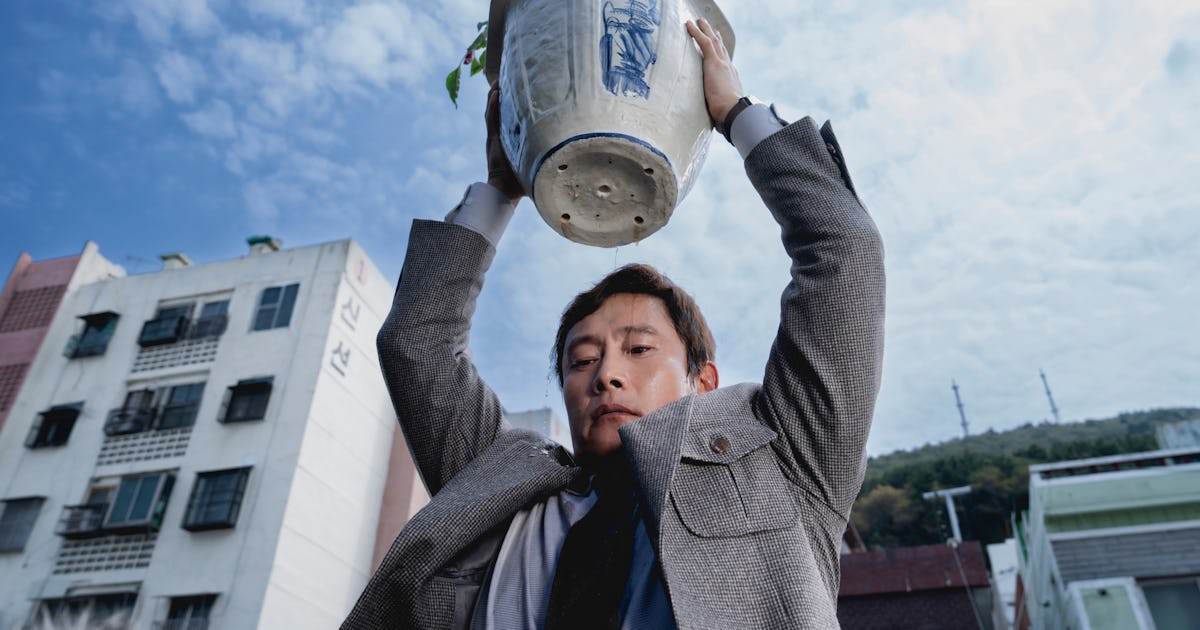The opening moments of No Other Choice, Park Chan-wook’s pitch-black new social satire, play almost like a dream: Man-su (Lee Byung Hun) has the perfect house, the perfect middle management job, a loving wife, two beautiful children, and two beautiful dogs. A crisp fall wind brings a shower of tiny leaves down on the lawn where he’s barbecuing a delicious cut of eel sent to him by his employers. The colors of the sky and the lush greenery surrounding his home feel brighter and more saturated than real life, almost like they’re artificial or imagined. But this is real, and Man-su could not be more grateful for it as he brings his family in for an embrace, declaring, “I’ve got it all.” Which, of course, means he’s in for a rude awakening when he’s suddenly fired from his longtime job as a paper manufacturing manager, putting him on the fast track to lose all that he’s worked so hard for.
Thus begins Park’s wild and winding new film, a social thriller that feels in many ways like a response to his friend and peer Bong Joon-ho’s landmark film Parasite. Except instead of a piercing tale of the haves and have-nots, Park has constructed a light and zany farce (and his funniest movie in over two decades) about how easy it is for the haves to lose everything, and the desperate lengths they will go to in order to maintain their charmed lives. It makes for the most fun and wildly entertaining movie Park has had in years.
No Other Choice’s first sign that it is goofier than almost anything the Oldboy and Decision to Leave director has done is when it makes Lee Byung Hun, mainly known in Korea as a serious leading man, do a pratfall in every other sequence. Western viewers may know Lee best from his role as as the antagonistic Front Man in Squid Game, but it truly is a surprise to see the studly actor play up his comedic talents as a hapless, goofy upper middle class dad who awkwardly stumbles over his words and trips over his own feet. But that’s exactly what kind of movie this is: a heightened black comedy that spirals into farce, taking some of the most unexpected, and sometimes frustrating, avenues. It’s by no means a straightforward film, but it quickly becomes clear that the odd, unpredictable tangents No Other Choice goes down are a feature, not a bug.
When Man-su is unceremoniously laid off from his job of 25 years, he vows to his supportive wife (a terrific Son Ye-jin) that he will get a new job in three months, tops. Thirteen months later, and the best thing he can get is a thankless job loading boxes at a warehouse. Now, his severance has run out, and the family has to face the worst possible option: downsizing. That means no dogs, no tennis team, no expensive cello lessons, and worst of all, no Netflix. The last straw for Man-su is the prospect of having to move out of their dream home and into a shabby city apartment. But Man-su, who worked hard to turn his old childhood home into the ideal mid-century modern house it is, will do anything to keep them from happening — even murder.
While the Parasite comparisons are inevitable, with No Other Choice wearing its class commentary on its sleeve, it’s clear that Park isn’t as interested in exploring the dark undercurrents of the film’s particular class commentary (particularly, the fragility of the upper middle class status) as he’s interested in skewering the social thriller as a whole. The sequences that brush up closest to Bong Joon-ho’s Oscar-winning movie, when Man-su decides to take out his competition for a lucrative job one by one, often take wild left turns — effectively pulling the rug out from underneath the audience and laughing as you slip and roll backwards down the stairs. The first time Man-su confronts one of his competitors, in particular, is a masterclass in comedy, taking turns both more hysterical and more violent than you could ever expect, with a conclusion so astounding that it earned enthusiastic applause from my audience at Venice.
It’s clear that everything about No Other Choice Park approaches with a sort of winking, detached irony. All the wild character dynamics and twists show just how much Park delights in turning our expectations on its head. A man as handsome and conventionally attractive as Lee Byung Hun’s Man-su shouldn’t be as buffoonish and inept as he is, nor should the the targets of Man-su’s desperate campaign for his dream job feel simultaneously like real, fleshed out people and impossibly cartoonish. But the best surprising standout of the film is Son Ye Jin as Man-su’s increasingly suspicious wife Miri, with the actress displaying an equally deft ability for both comedy and drama.
No Other Choice also feels like the next step in Park’s visual evolution, with the film’s heightened tone being matched by the director’s heightened visual flairs — there wasn’t a cross dissolve that Park didn’t love. And just like that dream-like opening scene, there’s a sharpness to Park’s direction here that lends the film a layer of unreality, allowing it to jump effortlessly between drama and comedy (though it more often lands in the comedy camp).
But its unpredictable twists and turns, both in narrative and tone, is what makes No Other Choice such a fun watch. It does have things to say about how precarious wealth and status really is, but it’s more likely to crack a wry joke about it then comment too seriously. After all, in a society as broken by capitalism and class as this, what else is there to do but laugh?
No Other Choice premiered August 29 at the Venice Film Festival. It does not yet have a U.S. release date.
Source link
Movies,inverse-movie-reviews,movies,thriller,entertainment,international-movies-film,homepage,hp-latest,adex-no-bid




Average Rating